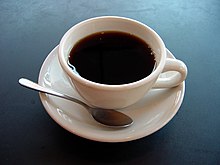Healthy eating habits/Healthy Eating for Productive Studying
It's easy to forget about healthy eating when trying to balance university, work and social commitments. This page provides an easy guide for making healthy eating habits a normal part of your day. Eating healthily optimises health and improves how productive you are during the day - definitely a bonus with all the study to get done! So why not give it a go? It's not as hard as you may think.

How can healthy eating help me study?
[edit | edit source]Eating healthy foods and drinking fluids frequently across the day can:
- Increase focus and concentration
- Improve energy levels
- Decrease your risk of headaches, tiredness and dehydration
- Help stop you getting rundown/sick
All of which can maximise how effective you are at getting things done, study and exam preparation included.
When should I eat?
[edit | edit source]
When you eat food your body breaks it down into energy. The brain in particular needs an even release of energy (in the form of a sugar called glucose) to perform at its best. To keep your brain happy it is recommended that you eat small meals often throughout the day (every 2-3 hours). In general, this means having 3 main meals and 2-3 snacks each day.
|
Tips for Eating Frequently
|
What should I eat?
[edit | edit source]You may have heard about the wonderful power of blueberries and walnuts on brain performance. Yes some foods do provide extra benefits but the most important key is to eat a wide variety of healthy foods - this ensures your brain and body get all the different nutrients they need.
Protein and fibre filled foods are your friends - they enable you to concentrate and feel fuller for longer. These types of foods include vegetables, fruit, nuts, seeds, eggs, low fat dairy products (milk, cheese, yoghurt), lean meat, fish and healthy grains and cereals (not white/refined - we’re talking about the good stuff – wholemeal/brown pasta, bread, rice etc.).
The Australian guide to healthy eating is used as a general guide as to the amount of these foods we should be eating each day for optimal health. To begin with aim to for vegetables and healthy grains to make up a half of what you eat each day. Snacking on vegetable and grain based foods is a great way to get started.

|
Healthy Snack Ideas
|
What and how much should I drink?
[edit | edit source]Sources of fluid include plain water and other drinks such as milk, tea, coffee, juice, soft drink. Fresh water is the best choice – it is your brain's favourite fluid for keeping you hydrated. Your body and brain need water for all vital functions.
Too little water intake can cause dehydration, making it hard to study and concentrate. To stop this from happening adult women and men should drink 2.1 – 2.6 litres (approx 8- 10 cups) of fluid each day. This may seem like a lot. Do not feel like you need to start having this much straight away, gradually work up to it.
|
Tips for Drinking More Water
Water does not have to be boring, get creative and make it interesting! Here are some helpful ideas to get you started:
|
Caffeine - good or bad?
[edit | edit source]
Like many students you may have found that a cup coffee or tea does wonders for your concentration. This is because it contains caffeine - in moderate amounts this substance acts on the brain to improve focus and feelings of tiredness.
In general tea and coffee are safe sources of caffeine provided you don’t have more than 400g which is approximately 4 cups of instant coffee or 2 to 2.5 small bought coffees per day. Listen to your own body signals to know when you have had too much caffeine (headaches, nervousness, sleeplessness).
Caffeine is also found in energy drinks. It is best to limit energy drinks - research has shown that they may increase your risk of heart problems.
Helpful Resouces
[edit | edit source]- Healthy snack ideas on a University student's budget
- Eat to succeed: A guide to healthy eating during university exams
- Healthy eating for tertiary students
- Healthy eating for college students on a budget
- Healthy Eating off Meal Plan
- Student survival guide to healthy eating
- AGHE summary booklet
- Effective Eating for Exams
- Superfoods for College Students
References
[edit | edit source]AHA. (2013). Energy drinks may increase blood pressure, disturb heart rhythm. Retrieved 22/10/2014 from http://www.heart.org/HEARTORG/News/NewsReleases/Energy-drinks-may-increase-blood-pressure-disturb-heart-rhythm_UCM_450577_Article.jsp
Chandra, R. K. (1997). Nutrition and the immune system: an introduction. The American journal of clinical nutrition, 66(2), 460S.
Mayo Clinic. Caffeine: How much is too much? Retrieved 22/10/2014 from http://www.mayoclinic.org/healthy-living/nutrition-and-healthy-eating/in-depth/caffeine/art-20045678?pg=1
NHMRC.(2006). Nutrient Reference Values, Water. Retrieved 22/10/2014 from http://www.nrv.gov.au/nutrients/water
NHMRC.(2010). About the Australian Guide to Healthy Eating. Retrieved October 22/10/2014, from http://www.eatforhealth.gov.au/guidelines/about-australian-dietary-guidelines.
UCLA Health. (2005). How nutrition and exercise can increase productivity and lower health care costs. Retrieved 22/10/2014 from http://www.uclahealth.org/body.cfm?id=502&action=detail&ref=134
Whitney, E., Rolfes, S.R., Crowe, T., Cameron-Smith, D., & Walsh, A. (2011). Understanding Nutrition: Australian and New Zealand Edition. South Melbourne, Australia: Cengage Learning Australia.
